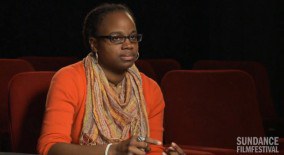Kicking It on Kickstarter!

The powerful coming-of-age film “Pariah” is currently playing to critical acclaim. Its post-production story demonstrates the crowdfunding potential of Kickstarter for women filmmakers.
Kickstarter, called “the people’s NEA” by The New York Times, recently sent out their 2011 round-up of success stories on their crowdsourced fundraising site, with women filmmakers taking significant applause on the roster—including Dee Rees’ “Pariah,” which won the Excellence in Cinematography Award, U.S. Dramatic Competition, at Sundance last January. While five Kickstarter films made it to Sundance in 2011, only “Pariah” broke out of the pack to be picked up by Focus Features (distributor of Sofia Coppola’s “Lost in Translation” and other Academy Award winners), making it the first film in Kickstarter’s game-changing, two-year history to do so.
“Pariah,” which began as an award-winning narrative short in 2006, explores a semi-autobiographical coming-of-age story through the eyes of a Brooklyn, New York, teenage girl, Alike (played with luminous fierceness by Adepero Oduye), who, as described on the Kickstarter website, “juggles conflicting identities and risks friendship, heartbreak, and family in a desperate search for sexual expression.” Following five and half years of fundraising that garnered support from The Sundance Institute and other sources, the feature version was shot in December 2009 over 19 days on location in Brooklyn. With the 35mm footage in the can, Rees and her producer, Nekisa Cooper, decided to launch a Kickstarter campaign to complete post-production in time for its premiere at Sundance.
Like many of the best Kickstarter videos, Rees chose direct audience address by appearing onscreen with her producer in the pitch. This personalized approach allows potential donors to connect with the back story, to witness the filmmaker-against-the-odds passion. In the case of “Pariah,” Rees and Cooper also evoked the viral “It Gets Better” YouTube series in support of questioning gay youth. While the comfort zone of most filmmakers remains behind the lens, this willingness to personalize the outreach in a confident but urgent conversation with potential supporters makes all the difference in a successful campaign and can often underwrite “the last leg of the journey,” as Rees requested in her video. The success of Dee Rees’s Kickstarter campaign adds to the accolades of a filmmaker recently named by Filmmaker Magazine as one of the “25 New Faces of Independent Film.”
In addition to “Pariah,” two of the other four Kickstarter Sundance entries this year featured significant contributions by women as co-writer/director (Lauren Wolkstein for “The Strange Ones”) and producers (Megan Griffiths and Lacey Leavitt for “The Catechism Cataclysm”).
While the “Pariah” fundraising goal of $10,000 managed to kick over to $11,011 in the final hours, women filmmakers in other extraordinary cases have managed unexpectedly to double or triple their goals, making Kickstarter’s top funders list.
In Jennifer Fox’s case for the successful documentary “My Reincarnation,” she broke all Kickstarter records and raised $150,000 to outstrip her original goal of $50,000.
Documentarian Alison Klayman, mid-shoot on a feature-length profile of iconoclastic Chinese artist Ai Weiwei, not only made the top funder list, but helped break the news of Ai Weiwei’s April imprisonment by the Chinese police in April, even appearing on the Colbert Report with the story.
These anecdotes and statistics are super-charged with possibility for women media makers. As Brenna Ehrlich of Mashable notes, “film reigns supreme when it comes to raising cash” on Kickstarter, indicating that women’s innate social media proclivities take on game-changing possibilities for the next decade of media production.
The genius of Kickstarter’s design is that small donations—as little as one or five dollars—can crowdfund the campaign to rollicking success. Kickstarter differs from sites like IndieGoGo, which allow campaigns to collect on whatever amount they raise. Kickstarter pinnacles on full goal achievement. If pledges do not meet the targeted amount by the final date, the entire campaign folds. The kinetic energy of the stakes involved and the sometimes frenzied use of Twitter and Facebook to broadcast the approaching zero hour often inspire complete strangers to invest in projects, with multiple $25 donations that can lead to a last minute angel wand waving to seal the deal. This year’s most dynamic underdog story involved the fundraising efforts of Los Angeles-based Aurora Guerrero for her feature film “Mosquita y Mari,” which managed to close a gap of $35,000 in just 48 hours. Kickstarter says it was “better than the playoffs.”
Kickstarter now has its top funder “Medici” list as well, meaning that for activists and supporters interested in helping to diversify images of women onscreen, donating to fledgling projects on the site can influence new narratives in media via crowdsourcing. Prior to the advent of crowdfund sites like this, the only way for non-film world cognoscenti to influence media was by viewing films and encouraging viewership after the fact at festivals, in theaters, or in their Netflix queue. Kickstarter and other crowdfunding sites now provide an opportunity for individuals to influence the discourse at the ground level.
The 2012 Sundance festival this month unveiled a total of seven out of 14 Kickstarter narrative and documentary film projects by women directors and co-directors, including Aurora Guerrero’s “Mosquita y Mari,” Alison Kayman’s “Ai WeiWei: Never Sorry”; Lisanne Pajot’s “Indie Game: The Movie”; Erin Greenwell’s “My Best Day”; Kate Aselton’s “Black Rock”; Valerie Veatch’s “Me At the Zoo” and Maria White’s short “The Debutante Hunters.”
More articles by Category: Arts and culture
More articles by Tag: Film



























